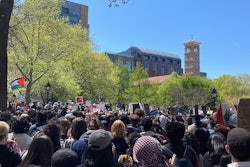
But most of all, cognizant of the recent turmoil over officer-involved deaths in Missouri, Baltimore and elsewhere, America’s police chiefs are looking for compassionate men and women who are in the field to do good.
Take Victor Ransom, whose first assignment as an officer in Jersey City, New Jersey, is bringing him to familiar territory: his own neighborhood. The 34-year-old former Marine is eager to hit the streets and gain the trust of his community.
“I know what they’re saying out there. I can hear them,” said Ransom, one of seven new black officers in New Jersey’s second-largest city. “I want to show them it’s not always one way.”
Police recruiting has entered a new age. Scrutiny and hostility for officers have amplified. Hampered by low pay and threats to generous pension plans, some of the country’s largest police forces saw significant drops in applicants long before chants of “hands up, don’t shoot,” ”I can’t breathe” and “black lives matter” entered the zeitgeist. Attaining and maintaining diversity remain challenges.
The obstacles police departments face post-Ferguson make some potential officers think, “Is that an occupation that I want to do?'” said Chuck Wexler, executive director of the Police Executive Research Forum.
Departments are seeing a mix of failure and success in attracting applicants.
Higher standards meant to attract better- and broader-educated candidates have sometimes turned away applicants, Wexler said.
Nearly one in four police officers work for a department that requires entry-level officers to have at least a two-year college degree or military service, according to Justice Department statistics. Among them: New York since 1996 and Philadelphia since 2013.
Police agencies that used to swing open their doors to a flood of applicants are turning to social media and slick online presentations like the Justice Department-backed Discoverpolicing.org to generate interest in a generation more apt to find excitement in technology-driven jobs than police work.




















